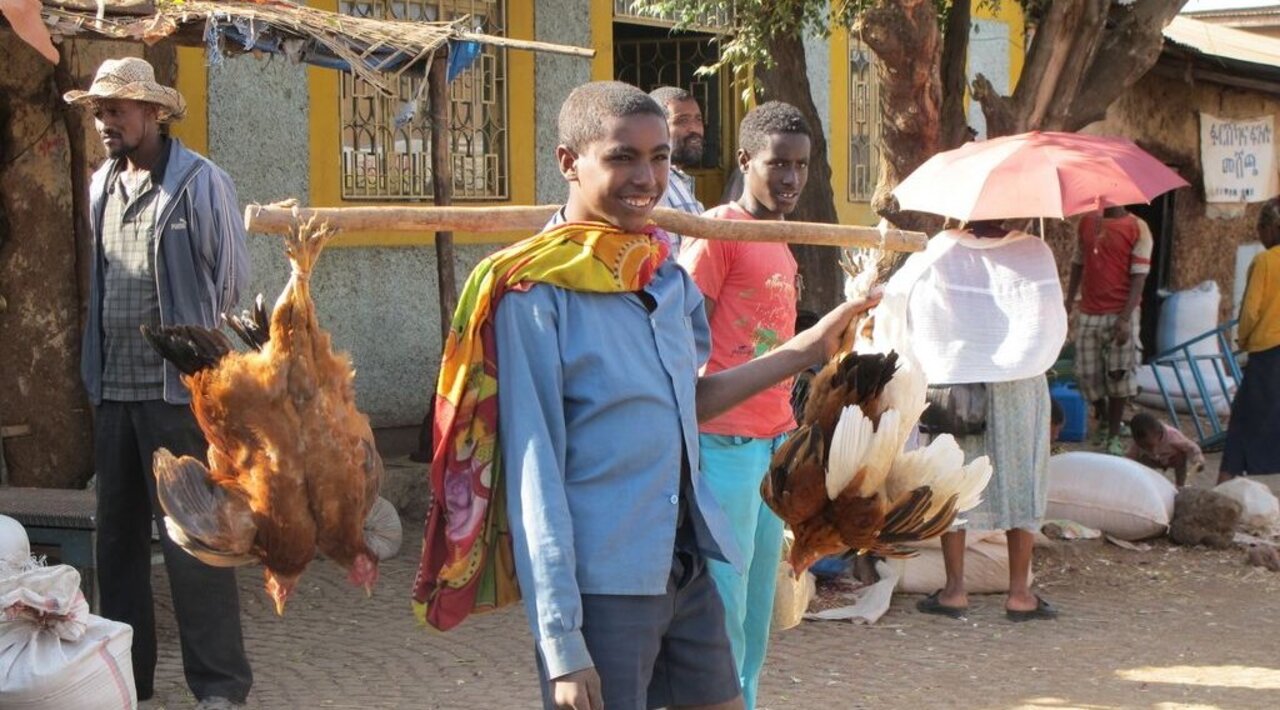Project
Impact of meat and dairy exports on developing countries (IMMPEX)

Impact of meat and dairy exports on developing countries (IMMPEX)
German exports of livestock products to Africa are frequently criticized. We analyze how these exports actually affect domestic poultry and milk production using Ghana and Senegal as examples.
Background and Objective
The aim of the research project is to investigate the effects of German and European exports on the agricultural sectors in two African countries that import large quantities of poultry and dairy products. Measures will be identified and analyzed to avoid or reduce possible undesired effects of exports. The following questions arise for our analysis: What exactly is exported? How much is exported? What are the effects on local production? How competitive is local poultry and milk production? What measures can be taken to avoid possible negative effects of German or European exports?
From Germany, mainly poultry meat, milk and dairy products are exported to Africa. Therefore, the focus of the planned research will be on the trade with these products.
Based on our preliminary work in the PrimeA project on the demand for imported poultry meat in Ghana, we will consider additional aspects in this project. We are therefore extending our consumer analyses in Ghana to dairy products and are also conducting consumer surveys on poultry and dairy products in Senegal. In addition, the production side and the value chains are taken into account. Using the global network agri benchmark, we collect data on typical farms and analyze them in an international context. Based on these results, we identify possible measures and related policies to avoid or reduce possible undesired effects of German or European exports.
Approach
In this project we investigate the above-mentioned issues in the areas of politics, production technology, value chains and consumer preferences. Therefore, the project consists of five work packages:
- In the first work package we investigate the trade flows of poultry meat and milk from Germany to the project countries Ghana and Senegal. For this purpose we prepare the necessary data and analyze them with regard to the developments of production and demand. In addition, the existing agricultural and trade policies in Ghana and Senegal are presented.
- In this work package we collect data sets of typical production systems and farms for the production of poultry meat and milk in Ghana and Senegal. This includes physical and economic performance, profitability and competitiveness in the international context. The methods and tools of the global network agri benchmark are made available for this analysis.
- In this work package we analyze local value chains in Ghana and Senegal. The main focus is on organization and infrastructure as well as marketing channels and value generation of local and imported products. Since there is hardly any information on this subject to date, we collect the necessary information through qualitative surveys on site.
- Consumers in Ghana and Senegal are decisive for the import of poultry meat and dairy products - especially their attitudes and preferences with regard to domestic and imported meat and dairy products. The data relevant for the project will be collected using quantitative methods.
- The institutional framework in Germany, Ghana and Senegal is of fundamental importance for trade and the resulting market effects. Therefore, we compare the different policy measures of the respective countries and subject them to an impact analysis. Here we examine the question of which measures are necessary to avoid or mitigate possible undesired effects of exports.
Our Research Questions
- What is the extent and significance of imports of farm animal products in Africa?
- What is the situation and perspectives of production in selected African countries in the international context?
- How are the value chains organized in the African investigation countries, and how are product flows of domestic and imported products structured?
- What knowledge, attitudes, expectations and preferences do consumers in African investigation countries have with regard to domestic and imported products?
- Which trade and agricultural policy measures already exist? Which impact would different policy changes have on markets and actors?
Results
- An analysis based on trade data (Project brief 2022/12a)
- Policy Measures in the Dairy and Poultry Sectors of Ghana and Senegal (Project brief 2023/12a)
- Poultry Sectors in Ghana and Senegal
3.1 Farm Performance and Economics of Broiler Production (Project brief 2023/05a)
3.2 Broiler Value Chains (Project brief 2023/09a)
3.3 Consumers’ Preferences in Ghana (Project brief 2020/16a)
3.4 Consumers’ Preferences under an Import Ban Policy in Senegal (Project brief 2023/06a) - Milk Sectors in Ghana and Senegal
4.1 Farm Performance and Economics (Project brief 2023/01a)
4.2 Value Chains (Project brief 2023/02a)
4.3 Consumers' Preferences (Project brief 2023/07a) - Impact Analysis of Agricultural and Trade Policies in Ghana and Senegal
5.1 Poultry Sector (Project brief 2023/11a)
5.2 Dairy Sector Project brief 2023/10a)
Links and Downloads
Thünen-Contact

Involved Thünen-Partners
- Boimah, MavisMA Institute of Market Analysis
- Boimah, MavisMA Institute of Market Analysis
- Chibanda, CraigBW Institute of Farm Economics
- Deblitz, ClausBW Institute of Farm Economics
- Gunarathne, AnomaBW Institute of Farm Economics
- Pelikan, JanineMA Institute of Market Analysis
- Schott, JohannaMA Institute of Market Analysis
- Thobe, PetraBW Institute of Farm Economics
- Weber, SaschaMA Institute of Market Analysis
- Weible, DanielaMA Institute of Market Analysis
- Zamani, OmidMA Institute of Market Analysis
Funding Body
-
Federal Ministry of Food und Agriculture (BMEL)
(national, öffentlich)
Duration
1.2019 - 4.2023
More Information
Project funding number: 28N1800017
Project status:
finished
Publications
- 0
Zamani O, Chibanda C, Boimah M, Asante-Addo C (2025) Aligning policy for success in developing countries: evidence from the poultry sector of Ghana. Agric Food Econ 13:5, DOI:10.1186/s40100-025-00348-8
- 1
Chibanda C, Wieck C, Sall M (2024) An analysis of the broiler value chain and economics of broiler production in Senegal: status quo after two decades of import restrictions. J Agribusiness Developing Emerging Econ 14(4):829-844, DOI:10.1108/JADEE-08-2022-0189
- 2
Boimah M, Weible D (2023) "We prefer local but consume imported": Results from a qualitative study of dairy consumers in Senegal. J Int Food Agribusiness Market 35(2):244-260, DOI:10.1080/08974438.2021.1986453
- 3
Zamani O, Chibanda C, Pelikan J (2023) Analyse der Handels- und Agrarpolitik: Die Geflügelsektoren von Senegal und Ghana. Braunschweig: Thünen-Institut für Marktanalyse, 2 p, Project Brief Thünen Inst 2023/11, DOI:10.3220/PB1673258013000
- 4
Zamani O, Boimah M, Gunarathne A, Pelikan J (2023) Analyse der Handels- und Agrarpolitik: Die Milchsektoren von Ghana und Senegal. Braunschweig: Thünen-Institut für Marktanalyse, 2 p, Project Brief Thünen Inst 2023/10, DOI:10.3220/PB1673257570000
- 5
Chibanda C, Thobe P, Almadani I, Deblitz C (2023) Broiler production in Ghana and Senegal: farm performance and economics. Braunschweig: Thünen Institute of Farm Economics, 2 p, Project Brief Thünen Inst 2023/05a, DOI:10.3220/PB1672822435000
- 6
Chibanda C, Boimah M, Weible D, Deblitz C (2023) Broiler value chains in Ghana and Senegal: organization, challenges and potential policy interventions. Braunschweig: Thünen Institute of Farm Economics and Thünen Institute of Market Analysis, 2 p, Project Brief Thünen Inst 2023/09a, DOI:10.3220/PB1672825380000
- 7
Boimah M, Weible D (2023) Consumers' preferences and consumption of dairy products in Ghana and Senegal. Braunschweig: Thünen Institute of Market Analysis, 2 p, Project Brief Thünen Inst 2023/07a, DOI:10.3220/PB1672821189000
- 8
Gunarathne A, Almadani I, Behrendt L, Chibanda C, Deblitz C (2023) Cost of production and profitability of dairy farms in Ghana and Senegal. Braunschweig: Thünen Institute of Farm Economics, 2 p, Project Brief Thünen Inst 2023/01a, DOI:10.3220/PB1672827140000
- 9
Boimah M, Weible D (2023) Das Importverbot für Geflügelfleisch im Senegal: Auswirkungen auf Präferenzen und Konsum. Braunschweig: Thünen-Institut für Marktanalyse, 2 p, Project Brief Thünen Inst 2023/06, DOI:10.3220/PB1672819717000






